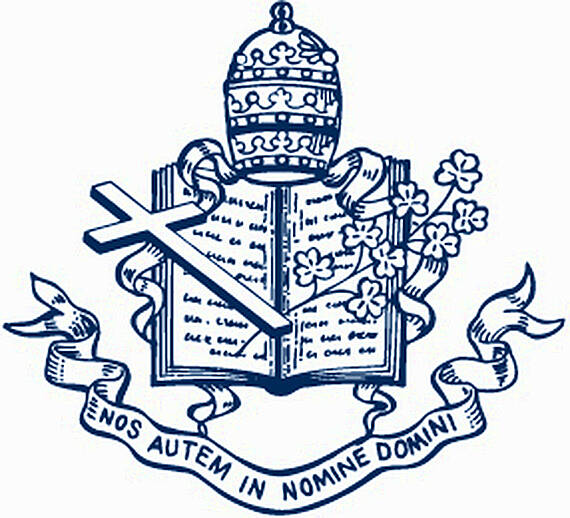1945 Opera: Patience
Senior House Drama

" Patience "
AT FIRST GLANCE Patience would appear to be one of the least suitable of the Savoy Operas for school production. Its plot is slight and somewhat intangible, centring as it does round the Wildean cult of aesthetics prevalent during the closing decades of the last century. Round a delicate satire on the aesthetes the entire piece is built. The humour of this fragile burlesque is therefore rather sophisticated and the centre of interest necessarily somewhat" dated." These facts place an initial strain on both actors and audience. That the performances in Castleknock, on 12th, 13th, 15th and 16th of December last were such an outstanding success, is no less a tribute to the histrionic and musical talent of the boys than it is to the genius of Gilbert and Sullivan.
Kevin O'Dwyer's Grosvenor we liked. Kevin slipped gracefully into the part and from the moment of his first appearnace in that delightful suit of " Lincoln green" one felt that he struck the right note. His singing of the lovely" Prithee, pretty maiden" was memorable. The delicate blend of humour and pathos of " The Magnet and the Churn" he rendered easily, aided by exceptionally rich tone and flexible quality of voice. His spoken lines, too, were delivered with a nice sense of their rhythm and music.
John McCabe who played the title role certainly looked the part of the naive village maiden. His voice, though small, rang true and though his interpretation of both lines and lyrics lacked what only the light of years can bring (he's just eleven!) everybody felt that in this part John had scored a distinct success.
Joe Masterson as Bunthorne carried a rather heavy and difficult part exceptionally well. The character is a nice blend of humour, satire and burlesque, and demands careful and balanced interpretation. Joe sang his rapid numbers with clear enunciation and a nice sense of phrasing and, what was not at all easy, succeeded in getting their "trancendental" humour across. In this matter he was particularly good in the number "If you're anxious for to shine...", where the use of gesture and line gave scope to his histrionic ability. His sense of "timing" where the dialogue verged on farce was, on the whole, excellent.
We thought John O'Byrne, who played opposite Joe, as Lady Jane, superb. From the moment they appeared together on the stage it was evident that John and Joe enjoyed playing their parts and to such a happy-go-lucky partnership-all too rare on the stage-any audience will make a very willing third. After we had seen them for five minutes we felt it did not much matter what they did next; we were going to enjoy it anyway. Such an atmosphere breeds success. Their scenes together in the second act were a riot of fun that reached a fitting climax in the duet "Sing Hey to You...", with its delightful tomfoolery. They certainly deserved their three (or was it four?) encores.
John O'Byrne's study of inflection and modulation stood him well in his spoke lines and the wealth of supercilious contempt packed into the final words ". . . . . . Oh! South Kensington!" was something to be remembered.
Peter McCabe as Colonel Calverley, Eddie Bourke as Major Murgatroyd and Paddy Hopkins as the Duke acquitted themselves well. The Duke was charmingly ineffective which was what he was meant to be. Peter and Eddie succeeded in being amusingly and artistically awkward, which is quite a different thing from being merely awkward. Eddie's patter song " If you want a receipt for that popular mystery" was sung with remarkable clarity, especially considering the pace at which it was taken. Their opposite numbers the Ladies Angela (Jim Kelly), Saphir (Conor Austin) and Ella (Jim Hamilton) were "perceptively intense and consummately utter." Finally, we should have entrusted Tom Davitt with the drawing up of our last will and testament so convincing a solicitor did he make.
The chorus work was accurate in both unison and part singing. The Love-sick Maidens looked about as lovesick as Lovesick Maidens should-in a light opera. Their voices were slight but formed a pleasing contrast to the volume of the Dragoons. They were especially effective in the Finale of Act One in the number " Let the merry cymbals sound."
We thought the chorus of Dragoons splendid. Their military bearing, the brilliance of their uniforms that added so much to the splendour of the spectacle, the evenness and good timing of their singing, and finally their precision of movement, helped largely to give the impression of slickness and polish that characterised the entire production.
And finally, a word about the setting. The dialogue and music of an opera grows naturally from the characters and their surroundings. Everything on the stage the scenery, the tiniest shade of lighting, the furnishings, the dress and line of the actors, all go to the making of the animated picture that passes before us.
The scenery was well up to, if it did not surpass, the exceptionally high standard which we have come to expect in the College productions of the Savoy Operas.
The orchestra, under the conductorship of Mr. Michael McGreal, was well balanced and without being unduly obtrusive gave excellent support to the singers, both soloists and chorus.
Patience certainly deserves a high place in the succession of Gilbert and Sullivan operas produced by the College.
T.0'F.
